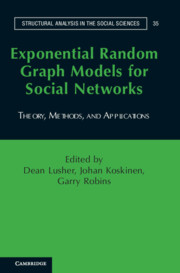Book contents
- Frontmatter
- Contents
- List of Figures
- List of Tables
- 1 Introduction
- Section I Rationale
- Section II Methods
- Section III Applications
- 14 Personal Attitudes, Perceived Attitudes, and Social Structures: A Social Selection Model
- 15 How To Close a Hole: Exploring Alternative Closure Mechanisms in Interorganizational Networks
- 16 Interdependencies between Working Relations: Multivariate ERGMs for Advice and Satisfaction
- 17 Brain, Brawn, or Optimism? Structure and Correlates of Emergent Military Leadership
- 18 Autologistic Actor Attribute Model Analysis of Unemployment: Dual Importance of Who You Know and Where You Live
- 19 Longitudinal Changes in Face-to-Face and Text Message–Mediated Friendship Networks
- Chapter 20 Differential Impact of Directors’ Social and Financial Capital on Corporate Interlock Formation
- 21 Comparing Networks: Structural Correspondence between Behavioral and Recall Networks
- Section IV Future
- References
- Index
- Name Index
21 - Comparing Networks: Structural Correspondence between Behavioral and Recall Networks
Published online by Cambridge University Press: 05 April 2013
- Frontmatter
- Contents
- List of Figures
- List of Tables
- 1 Introduction
- Section I Rationale
- Section II Methods
- Section III Applications
- 14 Personal Attitudes, Perceived Attitudes, and Social Structures: A Social Selection Model
- 15 How To Close a Hole: Exploring Alternative Closure Mechanisms in Interorganizational Networks
- 16 Interdependencies between Working Relations: Multivariate ERGMs for Advice and Satisfaction
- 17 Brain, Brawn, or Optimism? Structure and Correlates of Emergent Military Leadership
- 18 Autologistic Actor Attribute Model Analysis of Unemployment: Dual Importance of Who You Know and Where You Live
- 19 Longitudinal Changes in Face-to-Face and Text Message–Mediated Friendship Networks
- Chapter 20 Differential Impact of Directors’ Social and Financial Capital on Corporate Interlock Formation
- 21 Comparing Networks: Structural Correspondence between Behavioral and Recall Networks
- Section IV Future
- References
- Index
- Name Index
Summary
Relationship between Behavior and Recall
The question of whether we, as individuals, are reliable sources of information concerning our behavior has been debated for many decades in social network research. Because most research in this field uses individuals’ recollection of their behavior as a source of data (Marsden, 2005), assessing the reliability of our informants is not a trivial issue. This study focuses on comparing individuals’ actual behavior to their recall of that behavior. As such, I am not concerned with perception-based networks (e.g., friendship or trust) because they do not have to be related to the occurrence or frequency of a specific behavior. The reliability of individual recollection is, however, critical for research that relies on an accurate account of interactions between individuals. For example, the study of the diffusion of information relies on the account by informants of their actual communication behavior – was the message transmitted? – and not just on the interactions that they can recall.
Existing research comparing behavior and recall has mainly sought to understand how and why recall and behavior differ from each other at the individual or dyadic level. The BKS studies – a series of articles published by Bernard, Killworth, and Sailer (1979, 1981, 1982) – are the main body of work in this strand of research. They made an early attempt to assess the reliability of informants by observing the communication behavior of several groups of actors in different contexts and comparing it to the interactions that the actors reported during the same period of time. Their findings showed that respondents had a poor recollection of whom they communicated with and the frequency of these communications (Bernard et al., 1979), as well as questioned the reliability of social network data collected based on respondents’ recall (Bernard & Killworth, 1977; Killworth & Bernard, 1976).
Information
- Type
- Chapter
- Information
- Exponential Random Graph Models for Social NetworksTheory, Methods, and Applications, pp. 272 - 284Publisher: Cambridge University PressPrint publication year: 2012
Accessibility standard: Unknown
Why this information is here
This section outlines the accessibility features of this content - including support for screen readers, full keyboard navigation and high-contrast display options. This may not be relevant for you.Accessibility Information
- 2
- Cited by
